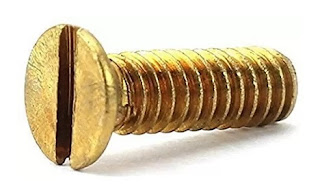Types Of Material Used for Screw Their Advantages and Application
🔗What is screw fastener? Parts of screw
Screws are made from a wide range of materials having unique properties and advantages. The choice of material for a screw depends on the required properties for a specific application, such as strength, corrosion resistance, weight, and conductivity. Here are some of the most common types of materials used for screws their advantages and application:
Steel: Steel is the most common material used for screws due to its strength and durability. It is relatively inexpensive and widely available. Uncoated steel is vulnerable to corrosion. Steel screws can be heat-treated to increase their strength, and they can be coated with various materials to improve their corrosion resistance. Steel screws are also readily available in various sizes and types, making them a good choice for many applications.
Stainless steel: Stainless steel is a general choice for screws in applications where chemical and corrosion resistance is a concern. It is highly resistant to rust, oxidation, and corrosion, making it ideal for use in harsh environments. In addition, stainless steel screw has an appealing finish and it is easy to clean and maintain, which makes it a popular choice in the food and beverage industry.
Copper and Brass: Copper screws have low strength but are highly resistant to corrosion and oxidation, making them ideal for use in applications where the screw will be exposed to moisture or other corrosive elements such as marine applications. Copper alloys have low magnetic permeability, and it also shows antimicrobial properties. That makes them suitable for use near magnets, sanitary and the medical industry. In addition, brass has a warm, attractive colour and is often used in decorative applications.
Aluminium: Aluminum screws are t is non-magnetic, lightweight and have a high strength-to-weight ratio, making them ideal for applications where weight is a concern. Aluminium screws are easy to manufacture, but it is not durable as other material. They are also highly resistant to corrosion and oxidation, which makes them a good choice for outdoor applications.
Titanium: Titanium is the premium material for a screw. Titanium screws are strong, lightweight, and highly resistant to corrosion and oxidation. They are often used in aerospace and other high-performance applications where strength and durability are critical. Titanium screws are also biocompatible, making them a popular choice in medical and dental implantation.
Plastic or Nylon: Nylon screws are a type of plastic screw. They are lightweight, non-conductive, and highly resistant to corrosion and oxidation. Nylon screws are often used in electronic and other low-load applications where a non-conductive fastener is required. It can be found in home appliances like electronics and washing machines. In addition, plastic screws are often less expensive than metal screws, making them a cost-effective choice for many applications.







